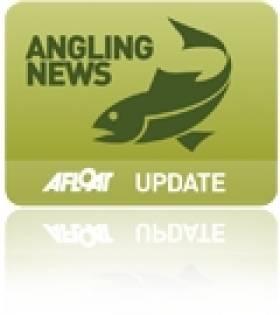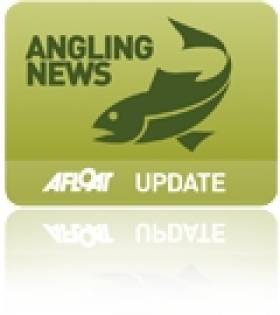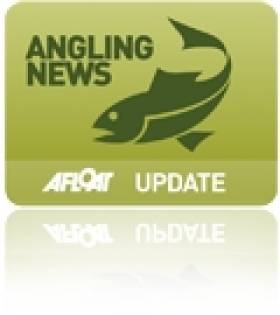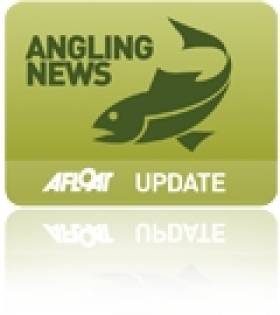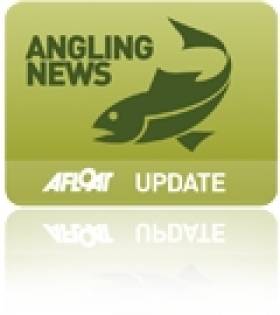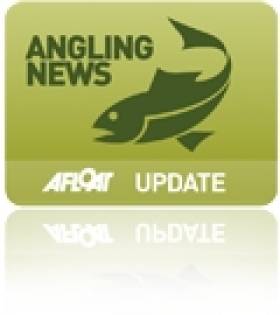Displaying items by tag: Ireland Angling Show
Minister Launches 'World's First' Angling Kit To Combat Invasive Species
#Angling - The fight to stop the spread of invasive aquatic species in Ireland took to the frontline at the weekend with the launch by Minister Fergus O'Dowd of an Individual Angler Disinfection Kit – the first of its type in the world.
The kits are produced by Inland Fisheries Ireland (IFI) and funded by the CIRB (Controlling Invasives, Restoring Biodersity) INTERREG IVA Project, and were launched at the Ireland Angling Show 2013 on Sunday 17 February.
The kit is available in a durable and convenient kit bag and comprises 20 Virkon Aquatic (50g) tablets; a 500ml plastic trigger spray bottle; disposable gloves; a stiff bristle brush for cleaning boots, etc; a practical instruction manual; invasive species identification cards on a handy key ring; a metal ‘Stop the spread of invasive species’ badge; and an array of useful and relevant invasive species literature.
Now available from IFI, the kit will cover disinfection for up to 20 angling trips, and will help ensure that invasive species are not spread by unsuspecting anglers as they move from one watercourse to another.
In recent years, IFI says it has worked closely with anglers’ federations, clubs and other grouping to ensure that they are aware of the risks posed by aquatic invasive species and of actions that they can take to minimise the risk of introducing or spreading these aggressive and potentially harmful species. Invasive species include aquatic plants, animals (insects and fish) and microscopic pathogens.
The minister said: “Disinfection facilities have been developed by IFI to cater for large groups of anglers attending organised competitions and these have been well received. However, there are many anglers who do not fish competitions and who like to seek the solace of a quite water body where they can test their skills against the resident fish or simply watch a float as it bobbles in the water.
“We want to raise awareness among these anglers and help them in the same way as competition anglers to guard against the introduction or spread of invasive species or harmful pathogens."
Logistically it is impossible to provide disinfection facilities at every watercourse in the country to cater for all of Ireland's anglers, so a different approach was required. IFI says it recognised the long-standing responsibility taken on by anglers to protect and not adversely impact the aquatic habitat or water quality, so it is providing anglers with a portable kit to make disinfection more efficient and cost-effective.
At the show, Minister O'Dowd demonstrated the kit with the assistance of Dr Joe Caffrey of IFI to show how individual disinfection of angler’s equipment and clothing is relatively simple and can prevent highly damaging invasive species such as Asian clam and zebra mussel, and fish pathogens like the salmon fluke Gyrodactylus from being transferred into un-infested water bodies.
The minister commented: "As I meet more and more anglers around the country I am struck by your enthusiasm, knowledge, expertise and environmental responsibility. As a budding angler myself I look forward to using this kit and I know that you will embrace this initiative to ensure that fishing as we know it now can continue and improve under our watch, safe from the introduction of hazardous invasive pathogens, plants and animals."
Minister Praises Ireland's Angling Resource At Specimen Awards
#Angling - The Irish Specimen Fish Committee (ISFC) held its Specimen Fish Awards Day yesterday (Sunday 17 February) in Swords, Co Dublin coinciding with the Ireland Angling Show 2013.
Successful anglers from all over Ireland who caught specimen fish in lakes, rivers or in the sea in 2012 were congratulated by Minister of State for Natural Resources Fergus O’Dowd on their excellent achievements.
Last year was a record one for angling in Ireland, with a total of 640 specimen fish being ratified.
Minister O'Dowd said: “The Government recognises that angling is hugely important to the tourist industry and to the economy generally. Preliminary information from a survey commissioned by IFI estimates that angling tourism spend is €250m million per annum – approximately €150m of which is generated by domestic anglers.
"Angling opportunities in Ireland are among the best in the world and this is reflected in the demand for the product and the numbers engaged in it both at home and from abroad.
"The quality of our angling resource is reflected in the annual report of the Irish Specimen Fish Committee. The committee accepted over 640 claims in 2012 – a record. Irish anglers took over 90% of these fish with visitors from overseas taking the remainder.”
The minster also emphasised the importance of the half-century of information about large fish caught by anglers in Ireland, both freshwater and marine, which has been collected by the ISFC over the years.
This information is not only an important historical and heritage record but also a vital guide for anglers when choosing the best angling venues, dates, times and method to catch large specimens of their favourite species.
Anglers departed the awards event with their certificates and plenty of information to target new species in the new angling season in 2013.
The Specimen Fish Committee (ISFC) report 2013 can be downloaded from www.irish-trophy-fish.com. If you catch a big fish in 2013, log on to the website to see how to register your fish as a specimen.
Learn How To Fish at the Ireland Angling Show 2013
#Angling - Bring the children and learn all about fishing at the Ireland Angling Show 2013 on Saturday 16 and Sunday 17 February at the National Show Centre in Swords, Co Dublin.
Fishing is a fantastic way to spend time with your children where you can learn about the environment, relax together in scenic surroundings while catching fish. At the Dublin Angling Initiative Kids Zone you can learn how to fish - whether you're a beginner, have some experience or have never gone fishing before, this show is for you!
Many of Ireland’s most experienced and well known anglers will be present on the day and will be giving freely of their time, knowledge and expertise.
And as previously reported on Afloat.ie, they will be joined by the likes of journalist Mike Thrussell, Discovery TV presenters Bob Nudd and Henry Gilbey, and champion fly caster Hywel Morgan, as well as professional guide Paddy McDonnell.
The Sealife Centre in Bray will be at the show with their amazing touch pool where you can identify and handle marine fish species, which is great fun for all the family. Inland Fisheries Ireland will also have native fish from our rivers, lakes and canals that you can identify. And following on from last year’s great success, Woodland Falconry will have a variety of some magnificent birds of prey on display.
A rod clinic will be available where you can try casting and learn about the equipment needed to go fishing such as rods and reels. Youngsters will be invited to take part in free interactive games and there will be prizes all weekend long. Children who visit the stand can even learn how to tie their own fly and be in with a chance to win a prize! Plus free fly casting lessons will be available from a professional fly casting instructor all day.
Fishing is a wonderful hobby and there is a wealth of waterways in your local area waiting to be discovered. There are potentially 500,000 people in Ireland who fish or would like an opportunity to fish, so come along and learn everything there is to know about fishing from the experts.
The Dublin Angling Initiative crew are looking forward to meeting you at the stand from 10am-6pm on the Saturday and 10am-5pm on the Sunday.
Big Names Join Cast for Ireland Angling Show 2013
#ANGLING - The Ireland Angling Show will be back at the National Show Centre in Swords for its 14th year on the weekend of 16-17 February 2013, bringing a host of big names to the capital to share their fishing knowledge.
Special guest for 2013 is sea angling expert and freelance angling journalist Mike Thrussell. No stranger to Irish waters, Mike will be sharing his knowledge and skill with demos and workshops over the weekend.
Bob Nudd MBE, another regular visitor to Ireland, will be part of the show team for 2013. Bob is well known as being one of the UK’s greatest anglers, with an extensive list of championship titles behind him. He's also a familiar face on TV, with years of presenting on Discovery Shed.
Joining them is Henry Gilbey, a fishing photographer, writer, TV presenter and consultant by trade - but at heart he’s an out-and-out fishing junkie with a very serious obsession with saltwater fishing in Ireland. Henry writes and photographs for fishing magazine all around the world, has presented four fishing TV series for Discovery and has just seen the launch of his third fishing book.
Returning for a third year will be the ever-popular Hywel Morgan and his talented daughters Yasmin and Tanya. Hywel is a world fly casting champion and has fished competitively the world over, winning numerous titles. Hywel also a has an impressive background in TV fishing shows.
Professional guide, fly casting instructor and angling writer Paddy McDonnell will be giving some talks at the show on fly fishing for salmon. The mystique that is sometimes associated with fly fishing for salmon can be daunting, especially for beginners, so this format will cater for anglers of all levels of experience.
A host of well-known angling experts will also be available with demos and presentations on every aspect of angling, whether sea, game or coarse.
Always a central feature at the Ireland Angling Show is the interactive family area, expertly managed by the very knowledgable Dublin Angling Initiative and their dedicated team.
Children of all ages and experience can learn everything they need to know to take up fishing, such as learning how to set up a fishing rod, tie a fishing knot and put bait on a hook. Many of Ireland’s most experienced and well known anglers will be present to give freely of their time, knowledge and expertise.
And as ever there will be a huge selection of tackle and trade stands offering products to suit every budget.
Organisers Mara Media have also announced that the show will coincide with the Irish Specimen Fish Committee Awards Day.
As previously reported on Afloat.ie, the awards will be held on Saturday 16 February 2013 at the Bewley's Airport Hotel. There will be a free shuttle bus running between the hotel and the angling show, as well as special room rates for anglers travelling to either event.
For more information and how to book your tickets visit www.irelandanglingexpo.ie.
Call for Roach, Rudd and Hybrid Specimens Ahead of ISFC Deadline
#ANGLING - The Irish Specimen Fish Committee (ISFC) will be accepting submissions of specimen claims for shad and cyprinids - such as roach, rudd and their hybrids - till 17 October.
The submission date has been brought forward due to the sophisticated genetic analysis involved in evaluating such specimens, which takes a considerable amount of time and expertise - and is necessary for their conservation, and to ensure the claims are processed in time for publication in the ISFC's 2012 specimen fish report.
All other claims should be submitted as soon as possible so that the ISFC can begin to assess all claims.
In other news from the ISFC, the next edition of its annual awards day will take place on Saturday 16 February 2013 at Bewley's Airport Hotel, coinciding with the 2013 Ireland Angling Expo at the National Show Centre.
Bewley's Airport Hotel will have a free courtesy bus running between the hotel and show. For anglers travelling to either event, the hotel also have special room rates staring at €59 per room. See the Ireland Angling Expo website for more details.
IADA Hosts 'Biosecurity Awareness' Evenings for Anglers
#ANGLING - The Irish Angling Development Alliance (IADA) is running a series of biosecurity awareness evenings at venues across Ireland over the next two months.
The evenings follow from the "success" of the IADA's awareness section at the recent Ireland Angling Show, and will provide an opportunity for more people to "meet with experts in the field and see what invasive species are first-hand".
Three events, in association with Inland Fisheries Ireland, are scheduled:
- 27 March at the Wetlands Centre, Ballybay, Co Monagahan (hosted by the Ballybay Angling Association)
- 18 April at the Cavan Crystal Hotel, Cavan (hosted by the Cavan Anglers Club)
- 23 May at the Salthill Hotel in Salthill, Galway (hosted by the Galway CAC)
All events run from 7:30pm till 9pm. Admission is free and all are welcome.
For more information contact Peter Walsh at [email protected]


























